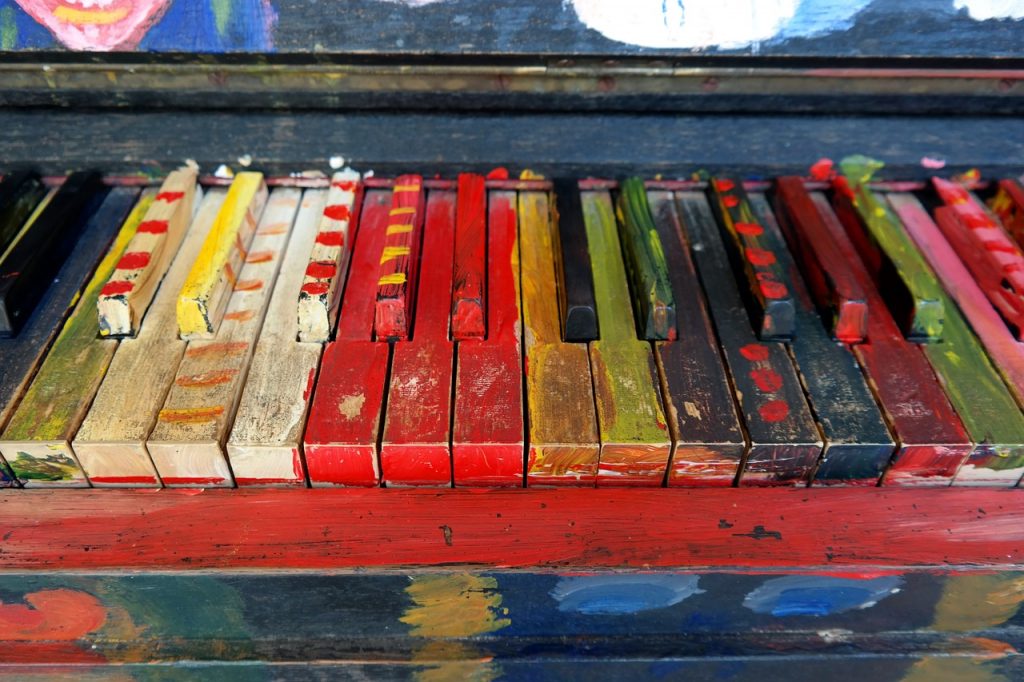
For many artists “genre” is a four-letter word. That’s not because right brains have difficulty with math – it’s because right brains defy being categorized. “You can’t put me in a box,” we say. We hate being lumped in with other people, unfairly oversimplified, misunderstood, and prejudged. We want people to give us a fighting chance to convince them that we’re worth paying attention to, and you just can’t convince people if they assume you’re like every other artist in your “genre” and they don’t give you a chance to change their minds. Clearly we have to stand out from the noise, set ourselves apart, and pioneer a new path that no one else has trodden, but are there benefits to associating ourselves with one specific genre?
We Don’t Like Limitations
There’s a part of me that bristles at the thought of focusing on one specific genre. One of the last things I want to hear myself say is, “”Well, I’m a (fill-in-the-blank genre) guy, so I can’t do that (fill-in-the-blank other genre) stuff.” Why can’t I do that other stuff? Why am I any less capable than another person to do that stuff? After all, we got into our various art forms because we were inspired (more often than not) by multiple genres. Some artists may have been drawn strictly to one particular style, but I think it’s more frequent that an artist finds inspiration in a variety of styles. It may have been epic hybrid orchestral music (like Hans Zimmer) that really got me into composing, but I can’t say I wasn’t influenced much earlier in life by classical, jazz, funk, Gospel, Afro-Cuban, Celtic, African, Mediterranean, and Russian music. I also can’t say that I wouldn’t love to to write and produce grooves in such diverse styles as Caravan Palace, Thievery Corporation, David Holmes, Zedd, and Moby. But you can’t expect to be very successful as a jack-of-all-trades. There are a few successful Renaissance men still alive (no, not the ones from the fifteenth century), but polymaths generally find themselves overshadowed by the single-focus experts who make their marks in highly specialized niches.
Should we take a lesson here? Why is it that the most highly acclaimed artists (barring da Vinci) find their calling in one particular area, one particular genre? There are many reasons, but here are ten that stick out to me:
1) Genre is a handle
The first thing someone (who’s interested) asks when you tell them about your art is “What kind of (your art form) do you do?” They’re asking for an anchor point, something they’re familiar with that you can compare your art to. It’s a means of understanding and cataloging information. Essentially they want a box to put you in so they can understand you better. We may recoil from this question (and sometimes we don’t even know the answer ourselves) because we don’t want to be limited or oversimplified, or maybe we don’t know who else does similar kinds of work, but one thing is for certain: You won’t hold people’s attention very long if your style is too vague, abstract, or broad to describe succinctly. Genre may feel like a box, but people need boxes in order to understand and relate to you (just like “What do you do for a living?”). Maybe they can even converse with you about it in greater detail now that they have an anchor point. You’ll lose some people who are biased against your genre, but you’ll gain others who enjoy it or are at least willing to consider it.
2) Genre gives you credibility
Ella Fitzgerald would probably never have gained popularity as a scat singer if she hadn’t first been able to sing lyrics traditionally. And I’ve never known a three-year-old to become famous for abstract art, since I’ve never know a three-year-old who had enough skill in standard genres to show the world he could be taken seriously. The same thing is true for us. If we are not competent in the genres that already exist, no one (or very few) will take us seriously when we try to stretch the boundaries of those genres (or do so unintentionally), much less when we try to create an entirely new genre altogether.
3) Genre makes you searchable
Just like being a handle, genre allows people to find your work more easily in books or online. If you refuse to let your work be described in terms of genre, you are severely limiting people’s ability to discover it. People need a box where they can find you. They need a category to search for. This is particularly true in nonverbal arts (e.g., music and visual arts), where it’s very difficult to coherently describe your work without resorting to genres. If you don’t use one or two basic genre keywords in your description, fewer people will probably stumble across it in their internet searches.
4) Genre attracts your target market
One benefit of being searchable is that you can more easily attract your target market–that is, people who are interested in your style of work. From a business standpoint, it’s much easier to win people’s interest if you are meeting a demand that already exists, a demand for a style that is already out there. To try to develop an entirely new genre from the start is a much harder thing to do. You kind of have to create the demand as well as the supply. You may win a cult following, but you’re not appealing to the masses of people who just want to experience more of the same. Once they decide they like your work, they’ll be much more willing to consider your pioneering projects. Beethoven’s 8th Symphony may not have been as popular as his 7th (even though he claimed the 8th was better), but people still listened to it because they liked him already.
5) Genre is predictable
Unless people are novelty hunters or hardcore art aficionados, they generally like to experience things they already know they’ll like. If you’re not specific about your style, you’re not advertising to the right crowd. Instead you’re hoping to engage a very broad audience that may or may not enjoy your art, and you’re not targeting the specific audience that is most likely to be interested in it. This is why there are genre-specific radio stations. They allow the people who like a particular style of music to easily and predictably enjoy music that was made by artists in that style. It’s also why many art shows have a specific focus like a particular medium or style. People like to experience art in a style that suits their mood.
6) Genre gives you focus
One of the most exciting yet daunting things as an artist is to see a blank new computer file, canvas, or page. There are so many possibilities. But knowing your genre ahead of time makes it simpler to get started. You can immerse yourself in studying the artwork in your field. Find pieces that inspire you. Enjoy those pieces over and over and over again until you can recall them in vivid detail. Try to figure out why the piece is so compelling. If you focus on a particular field, you will (hopefully) get better and better in that field until others start to see you as an expert. There are probably tutorials, classes, training, or blog posts out there about your style. Study them and learn all you can about it.

“If I have seen further, it is by standing on the shoulders of giants.”
– SIR ISAAC NEWTON
7) Genre gives you experts
Art isn’t created in a vacuum. You are always influenced by others who have gone before you. It’s best to realize that and draw on their expertise in order to grow as an artist. Think about the artists you want to be like, and try to figure out how they got to be who they are. What influenced them? Try to get in touch with your heroes (even if the big names are hard to reach, you can still find someone who’s a little ways ahead of you in your field). Pick and choose what elements of the experts you want to use. You’re not going to be the next “them.” You’re going to be you. Learn how your experts learned how to be so good at their genre.
8) Genre gives you rules
There are always ground rules you must follow, instruments you have to include, materials you have to build with, colors or patterns you have to use. These rules are to your advantage. They allow people who are stirred by the same ideas to evaluate your work and give you tips on how to improve. They allow you to speak a common language with others who understand (better than most) where you’re coming from. These rules inform your decisions on what to include and what to exclude from a piece. They give you a structure on which to hang your feelings, rather than just launching forth into the unknown, throwing everything you can think of into a piece, and then getting confusing feedback because people don’t know what to expect.
9) Genre communicates something
Every genre exists for a reason. There are certain fundamental ideas or emotions that are communicated by each one. Some genres are about belonging to (or wanting to belong to) a particular social group. Others are focused on politics and social justice. Some emphasize natural resources. Others require advanced technology. Some are meant to entertain, and others are meant to address serious issues in the world. Some are meant to be very realistic, and others are intended to be quite abstract or fantastic. Some deal with sorrow, anger, and fear, while others are meant to lift up, encourage, and exult. Use your genre as a carrier to communicate with your audience. Find your personal variation of it. It’s far more moving to experience art that you can relate to, and you relate best to it if you’re somewhat familiar with the medium. Beethoven would probably be appalled at even the best jazz musicians because he had no reference point for the genre.
10) Genre gives you specificity
Genre allows you to focus on one area and study the experts in that area in order to improve in and contribute to that area. As I said earlier, gone are the days of the Renaissance man. Today’s world requires specificity in order to see advancement in a field. Doctoral dissertations are extraordinarily specific. The fundamental laws of motion are already discovered–you can’t rediscover them. But you might be able to help people out by analyzing a very specific application of those laws–say, for instance, as you design a new airplane. It’s not that there won’t be more great discoveries–it’s just that it’s rare that a single discovery will be world-changing. It’s often more productive to apply what’s already out there to specific new applications, rather than trying to come up with an entirely new field.
And finally, two things genre does NOT do…
In case you’ve thought of a few arguments against specializing in a particular genre, I want to point out two things a genre does not do:
1) Genre does NOT define you
I was worried that my field of study in college would define me (I primarily studied engineering instead of music), but it gradually dawned on me that degrees, education, training, even profession, don’t define us (it’s still hard to believe this). You are much more intricate and valuable than just being a musician, a painter, a sculptor, a dramatist, or even an artist. No genre will ever express your full complexity, so don’t expect it to and don’t think it does. Focusing on a particular genre does not box you in. It gives you a platform, a vehicle, to travel even farther. And who says you can never switch (or meld or expand) genres? That’s part of your journey as an artist.
2) Genre does NOT steal your inspiration
You can still (and MUST!) draw from other genres and art forms as you add your touch. That’s why it’s so great that YOU are the artist. You’re adding what no one else can add to the state of the art. We don’t need another Beethoven or Picasso or Shakespeare, we need YOU. The same reasons you got into art in the first place are the same things you can still include in your work, but you do so through a particular genre in order to make those influences accessible to others. You can bring in elements of classical, blues, jazz, funk, rock, and Latin in music, but you have to do so in an organized and accessible manner without completely obliterating genre and confusing your audience. And you don’t have to describe your art in such complex terms. Use simple, focused language that people can relate to. You’ll still be you whether they know every detail of your thought process or not. And besides, giving more detail is what liner notes and interviews and detailed biographies are for.
Thanks for reading. I’d love to hear from you, so comment below with your thoughts. Why did you choose your particular genre? Have you ever switched genres? Or if you don’t have one, why not?

great article – has helped me clear a mental block i’ve had for over a decade. thank you!
Glad to hear it, Jesse! Let me know what kind of genre you decide to pursue now!